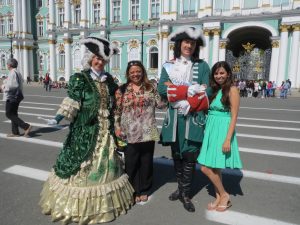 What is your current field of research?
What is your current field of research?
International higher education. On one hand, government-university relations fascinate me. How and why it is that governments invest (or not) in higher education? How and why do they promote “national” interests through international higher education? I am interested in understanding the role, functions and purpose of higher education in promoting soft power diplomacy for states.
On the other hand, at a micro level, I am keenly interested in understanding how these macro government policies gets translated into lived experiences for students. If and how it is that students who engage in international education programs begin to (re) define their sense of self, nationality and citizenship, their place in the world and their world view/s vis a vis those from other nations.
What inspired you to specialize in this line of research?
My father! As a child he always encouraged me to explore the world –travel, meet people, read and broaden my thinking from multiple histories, geographies and cultural perspectives. My own experience as an international student in the U.S., as an administrator of bi national academic exchange programs in India and more recently as an immigrant to Canada have largely shaped my interest in, approach to and understanding of my field of research.
What impact do you want your work to have on society?
I want to effect policy because policy matters. It matters to the everyday lives of our educational institutions and its many constituencies. It matters in achieving the fundamental principles, ethics and values of education. I firmly believe that all too often we feel imprisoned and constraint by policy directives, particularly government policy directives. However, the more we understand policy as process, we can become empowered through our own participation in it, democratizing in the long run, its formation, implementation and effect.
What do you consider to be your biggest research accomplishment so far?
It is hopefully still to come! The one ‘event’ I have been most proud of is a conference I was instrumental in hosting at York in 2006 which initiated among the first major national discussions on internationalization of Canadian higher education. It brought together over 200 participants, including representatives of all levels of government (federal, provincial and municipal) 33 university from 9 provinces, non-profit organizations and the private sector to discuss policies, practices, challenges and opportunities. This conference resulted in one of the first publications on Canada’s international education, Canada’s Universities Go Global in 2009. Several of my colleagues attribute the launch of their careers in international education to this conference and publication.
Do you have any advice for students interested in Education?
Education is not a profession it is a passion. It is about fulfilling the human mind, soul and body through knowledge and enlightenment. It is about constructing, deconstructing and rebuilding new ways of knowing and understanding. It’s about sharing, caring and co-creating a community- between and across various geographies. It is about civilizational dialogue and understanding. I encourage you to explore diverse ways of studying education and become an educator.
What advice would you give to your 21-year old self?
Engage! The best learning and growth occurs through investment and engagement in issues pertaining to your school and your immediate and broader community. Join student groups, non-governmental organizations, other community organizations locally, nationally and internationally. Work in a co-op; participate in an internship program, volunteer at a community center. By engaging you understand issues from multiple perspectives, come to value voice-yours and those of others, and more seamlessly appreciate the integration of scholarship, policy and practice.
What would students be surprised to know about you?
I always did things early- I started university at age 15, got two masters at age 20, married at age 19—and then reversed it all by changing my career to become an academic in my late 40’s!
Also, I love designing interiors. My first college major was interior design! As a child I spent hours every Sunday re-arranging the furniture in my house, much to the displeasure of my mother and siblings. I still continue to do so, much to the displeasure of my husband and son. I simply love creating aesthetically pleasing environments!
